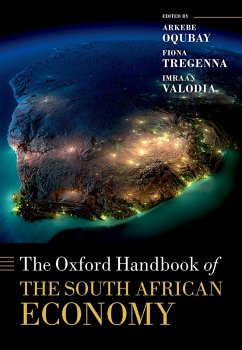
The Oxford Handbook of the Economy of Cameroon (eBook, PDF)

PAYBACK Punkte
47 °P sammeln!
Cameroon's suboptimal economic experience since independence (1960) sheds light on broader issues of Africa's development narrative, and provides valuable economic and policy knowledge. While Cameroon's large informal economy is diverse and resilient and rooted in old business traditions, its formal economy has exhibited low productivity and employment growth for over 60 years. This has brought anger, disappointment, and violent conflict in several regions of the country. The Oxford Handbook of the Economy of Cameroon examines the reasons of Cameroon's unsatisfactory economic performance and d...
Cameroon's suboptimal economic experience since independence (1960) sheds light on broader issues of Africa's development narrative, and provides valuable economic and policy knowledge. While Cameroon's large informal economy is diverse and resilient and rooted in old business traditions, its formal economy has exhibited low productivity and employment growth for over 60 years. This has brought anger, disappointment, and violent conflict in several regions of the country. The Oxford Handbook of the Economy of Cameroon examines the reasons of Cameroon's unsatisfactory economic performance and draws lessons from successful development experience to help tackle these issues. The Handbook provides a critical assessment of the history, patterns, and strategies of economic development in Cameroon, and outlines new approaches to economic enquiry for prosperity and social change. Through Cameroon's governance story, the handbook analyzes the evolving conceptions of economic policy, takes stock of intellectual progress, documents the challenges of implementation, and outlines the intellectual and policy agenda ahead. For a developing country increases in per capita income arise from advances in technology arise from closing the knowledge and technology gap with those at the frontier. And within any country (especially one like Cameroon), there is enormous scope for productivity improvement simply by closing the gap between best practices and average practices. Standards of living can therefore be improved through the implementation of pertinent learning strategies. In this Oxford Handbook of the Economy of Cameroon, an international team of leading development economists and researchers address the wide range of issues facing Cameroon and provide guiding principles on how best the country (and other developing nations) could move human, capital, and financial resources from low- to high-productivity sectors in a constantly changing global economy.
Dieser Download kann aus rechtlichen Gründen nur mit Rechnungsadresse in A, B, BG, CY, CZ, D, DK, EW, E, FIN, F, GR, HR, H, IRL, I, LT, L, LR, M, NL, PL, P, R, S, SLO, SK ausgeliefert werden.













